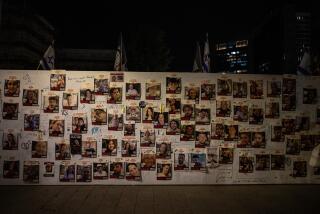Once Upon a Time, Terrorists Had Some Standards
- Share via
Once upon a time terrorists had a code of honor; the targets selected for assassination were kings, ministers, generals or police chiefs.
When in 1904 a group of Russian revolutionaries went out on a mission to kill a certain grand duke, the action was canceled at considerable risk to their own lives because the duke traveled with his wife and his small children and there was the danger that innocents would be hurt. This historical incident inspired Albert Camus to write one of his best known plays.
Contemporary terrorism has not just become indiscriminate, there seems to be a particular temptation to single out innocents, partly no doubt because these are much easier targets than well-guarded public figures. Terrorists, like the Chechens who took schoolchildren as hostages, have persuaded themselves that there are no innocents -- after all, children will grow up and some of them could be soldiers or policemen one day.
Fanatics cannot accept moral taboos for both ideological and practical reasons. The Russian revolutionary of 1904 had no hesitation to kill a leading figure of the hated regime, but he also believed that killing was a mortal sin. The terrorist of 2004 does not feel such compunction; murder has become not only permissible but a holy duty. In his world, infidels (and also many of his own coreligionists) are fair game.
Religious fanaticism is of importance in this context, but it is not the only key to understanding growing barbarity. The murder of more than 20 children in the Israeli village of Maalot in 1974 was committed not by Islamist radicals but the Democratic Front for the Liberation of Palestine, a secular, self-styled left-wing group.
Over the centuries, rules and laws of war have developed, but terrorists feel that they cannot possibly accept them. It would be suicidal from their point of view if they were to wear uniforms or other distinguishing marks as international law demands. The essence of their operations rests on hiding their identities and on indiscriminate attacks against civilians.
On the other hand, they insist that when captured they should enjoy all the rights and benefits accorded to prisoners of war, that they be humanely treated, even paid wages as prescribed by the Geneva Convention. When regular soldiers do not stick to the rules of warfare -- when they kill or maim prisoners, carry out massacres, take hostages or commit crimes against civilians -- they will be treated as war criminals. Terrorists, on the other hand, are firmly convinced that they are not bound by these rules.
Will governments continue to accept these principles of asymmetric warfare? There is not much room for optimism. It is unlikely that governments will be impeded in their defense by laws and norms belonging to a bygone (and more humane) age.
But is indiscriminate murder of innocents not self-defeating? Will it not lead to the isolation of the perpetrators? In this respect, too, one should not overrate the extent and effect of moral revulsion. Standards of human rights (and the value of human lives) are not the same in all societies.
Sometimes there will be an outcry, as in the case of the two French journalists held hostage; the pope and the U.N. secretary-general will appeal, as well as many others. But who outside Nepal protested when 12 poor Nepalese workers were murdered in Iraq last week?
Our contemporary terrorists are neither diplomats nor experts in public relations; they know that they have and will retain, whatever they do, a certain amount of support within their own communities, and more they do not need. They do not feel restraints -- except perhaps political expediency. And thus the descent to barbarism continues.
Walter Laqueur is the author of “A History of Terrorism” (Transaction, 2001).
More to Read
Sign up for Essential California
The most important California stories and recommendations in your inbox every morning.
You may occasionally receive promotional content from the Los Angeles Times.









